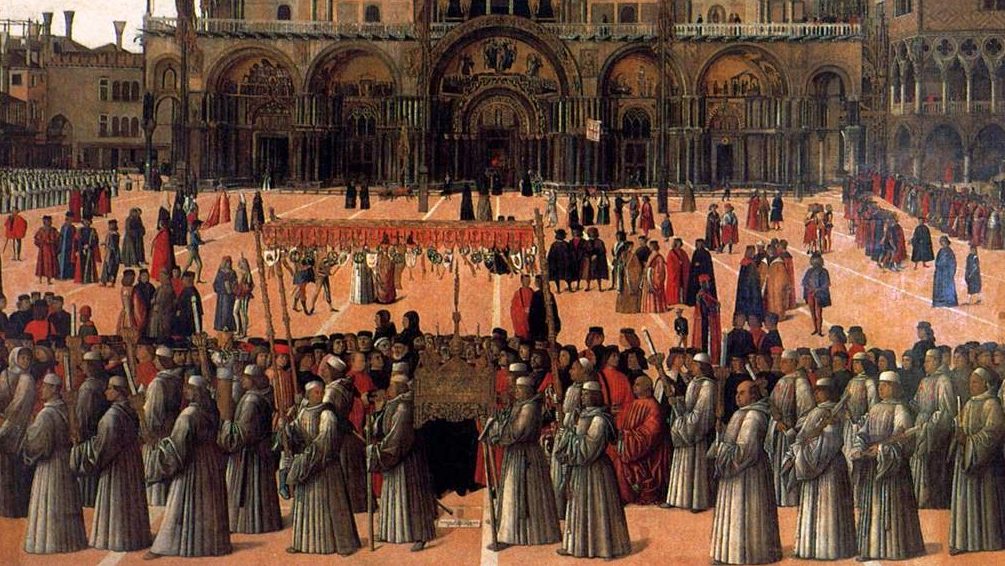The Solemnity of Corpus Christi
What you need to know about the Feast of the Body and Blood of Christ
The Sunday after the Solemnity of the Holy Trinity (which is celebrated on the Sunday after Pentecost) is celebrated as the Solemnity of the the Body and Blood of Jesus Christ, otherwise known as Corpus Christi (Latin for “Body of Christ”). Here’s a little primer on what you need to know about this feast dedicated to the Eucharist.
- The Catholic Church teaches that Jesus Christ is truly present in the sacrament of the Eucharist. Jesus is said to be present “Body, Blood, Soul and Divinity,” which is to say the Eucharist contains the whole Christ, both his humanity and divinity, in a form that can be received by us as food. This is a great manifestation of God’s humility and desire to be with us.
- The manner in which Jesus is present in the Eucharist is called transubstantiation. This is a fancy word that means the substance of the bread and wine has been transformed into Christ. This may be confusing for us, because today we think of “substances” as “stuff” (like water is a substance, or oil is a substance), but here the term is used philosophically. In philosophical language, substance refers to the essential nature of a thing — the “whatness” of it. The doctrine of transubstantiation means that the substance, or the “whatness,” of the Eucharist is fully transformed into the presence of Jesus Christ, while the physical properties remain as bread and wine. Thus it takes faith to discern the presence of Christ in the Eucharist. We trust in Jesus who said, “This is my body” (cf. Mk 14:22, Lk 22:19, 1 Cor 11:24).
- The liturgy of the Eucharist is what we commonly call the Mass. While every Mass is a celebration of the Eucharist, a special feast day in which Christ’s real presence in the Eucharist is celebrated with particular zeal has been observed in the Church since the 13th century.
- The idea for such a feast originated with a Norbertine sister named St. Julianna, who had a special devotion to the Eucharist and is said to have received visions imploring her to advocate for the introduction of a feast of Corpus Christi to the Church’s calendar.
- The feast was first celebrated in 1246 in the diocese of Liège (in modern day Belgium), where St. Julianna was from.
- In 1264 Pope Urban IV extended the celebration of the feast to the universal Church.
- The feast was originally celebrated on the Thursday after the feast of the Holy Trinity. The observance on Thursday honors the institution of the Eucharist at the Last Supper which took place on Holy Thursday, the evening before Christ was crucified on Good Friday.
- In 1969 Pope Paul VI gave permission to episcopal conferences to transfer the feast to the Sunday after the feast of the Holy Trinity. Today in many parts of the world, including the United States, the Feast of Corpus Christi is celebrated on a Sunday in order to make it more accessible for the people.
- When Pope Urban IV established Corpus Christi as a universal feast, he commissioned St. Thomas Aquinas to compose the liturgical texts for the new feast. The texts composed by St. Thomas Aquinas for this feast include the Eucharistic hymns Adoro te devote and Pange lingua. The last two verses of Pange lingua are often sung by themselves as Tantum ergo during Benediction of the Blessed Sacrament. The O Salutaris hostia which is sung at the beginning of Eucharistic Exposition is actually the final two verses of the hymn Verbum supernum which St. Thomas composed for Lauds of this feast. St. Thomas also composed the sequence for this feast (sung before the gospel), Lauda Sion. (Links to videos of these hymns are provided at the end of this article).
- Traditionally this feast has been observed with a special Eucharistic Procession. This is when the Eucharist is processed solemnly in public, with the faithful participating with hymns and prayer. Eucharistic Processions began in Germany soon after the institution of the feast of Corpus Christi, and by the 14th century the practice had spread throughout the Church. Eucharistic Processions became especially popular after the Protestant Reformation as a way of reasserting the Catholic faith in the Real Presence.
- Today, the Second Vatican Council reminds us that the Eucharist is “the source and the summit of the Christian life,” underscoring the centrality of this sacrament in the life of the Church.
- Starting with this year’s Solemnity of Corpus Christi, June 19, 2022, the US Conference of Catholic Bishops (USCCB) is inaugurating a three-year Eucharistic Revival, including a National Eucharistic Congress in Indianapolis July 17-21, 2024. You can read more about the Eucharistic Revival at www.eucharisticrevival.org.
- Locally, the Diocese of Charlotte holds a Eucharistic Congress every year, which includes a Procession through downtown Charlotte. Normally it’s in September and our campus ministry attends as a group, but this year it takes place while we are on summer break on August 5-6. You can get more information at www.goeucharist.com. We hope to see you there!

